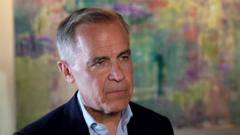Concerns about representation and cultural identity fuel Alberta's push for sovereignty and potential separation from Canada amid a decade of Liberal governance.
Alberta’s Call for Sovereignty: A Growing Movement Amidst Political Tensions

Alberta’s Call for Sovereignty: A Growing Movement Amidst Political Tensions
Western Canadians Express Discontent with Federal Rule, Sparking Discussions of Independence
In a small event hall in Lethbridge, Alberta, an intriguing debate is unfolding regarding the province's future. Dennis Modry, a retired heart surgeon, stands before a crowd of around 100 attendees, querying their sentiments about Alberta's direction. As hands raised in response expose a deep gulf in opinion, the notion of independence from Canada emerges with increasing fervor.
Fueling this conversation is a growing sentiment in western Canada, increasingly disillusioned with the perceived unresponsiveness of the federal government amid a decade of Liberal leadership. Modry, co-leader of the Alberta Prosperity Project — a grassroots organization advocating for independence — noted that recent comments from US President Donald Trump about Canada potentially becoming the 51st US state have given fresh impetus to this separatist movement.
"That's not what we're interested in," Modry clarified. "What we seek is Alberta sovereignty." His sentiments are echoed by Jeffrey Rath, a Calgary lawyer and rancher, who sees the cultural similarities between Alberta and the neighboring US states as a pivotal argument in the discourse. "We resemble folks in Montana and Texas more than other parts of Canada," Rath stated, pondering the potential future of Alberta aligning with the US.
Long considered a fringe notion, discussions of Alberta's separation are now mainstream, with former Alberta Premier Preston Manning warning that many in the west are unwilling to tolerate another Liberal administration. He described a potential vote for the Liberals as a vote for Canada's breakup, voicing concerns that the party has perpetually overlooked Western interests.
Western alienation — a term signifying the dissatisfaction felt in provinces like Alberta and Saskatchewan due to their representation — has simmered for decades. This resentment intensified during the Liberal government’s tenure, with policies perceived to undermine Alberta's rich oil and gas sector.
Recent national polls hint that the Liberals under Mark Carney might secure a fourth consecutive victory in the impending election, raising concerns among Albertans who feel marginalized by eastern-focused policies. Judy Schneider, whose family works within Alberta’s oil industry, voiced her support for an independence referendum, expressing skepticism about the new Liberal leader’s connection to Alberta.
Despite current polls suggesting that only about 25% of Albertans would favor independence immediately, the issue has gained traction nationally, as shown by an independent Nanos poll indicating that many Canadians consider the matter deserving of serious discussion.
Political analysts suggest that whichever party emerges victorious faces an intricate challenge of uniting a country divided along regional lines. Alberta Premier Danielle Smith has been vocal about the potential for a "national unity crisis" if Alberta's requests, primarily concerning resource management and environmental regulations, are not addressed promptly.
In Lethbridge, discussions reveal varied opinions within the independence movement. Lorna Guitton, an Albertan resident involved with the Alberta Prosperity Project, seeks improved relations with the federal government rather than outright separation. Others, however, distinctly resonate with the idea of aligning more closely with American counterparts given shared political values around free enterprise.
Rath’s vision for the future sees Alberta potentially thriving within the US framework, further indicating the complexities and nuances of the independence dialogue. On the other hand, many Albertans contend that an urgent need exists to prioritize unification and collaboration over separation, indicating a diverse array of perspectives on the pressing issues facing their province.
In the face of this evolving narrative, Alberta's political landscape continues to shift, suggesting that the debate about its future prominence within Canada will remain a pivotal topic leading up to the elections and beyond.






















